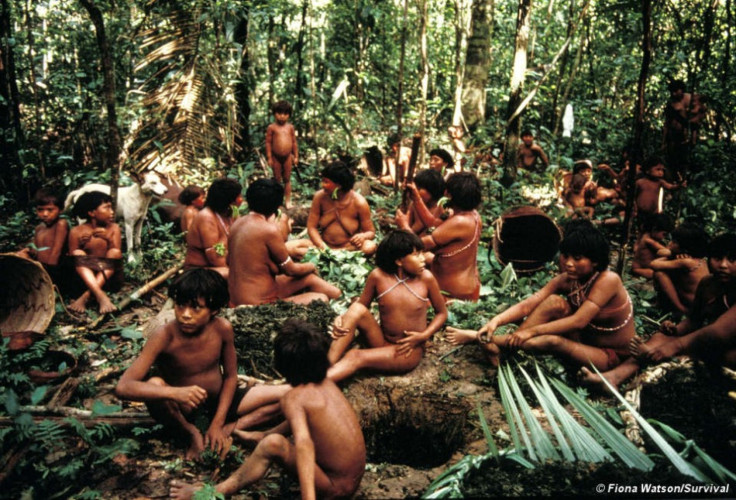Culture Clash: Amazon Tribe In Venezuela Alleges Illegal Gold Miners Massacred Village Residents

"Charred bodies and bones" are what witnesses said they found remaining of around 80 members of an indigenous tribe in the Venezuelan Amazon.
Members of the Yanomami tribe -- said they spoke with the only three survivors from the settlement, known as Irotatheri Shapono, who claimed they were targeted by Brazilian gold miners seeking unlicensed access to the surrounding land.
The Yanomami comprise a population of about 32,000 live in a territory that encompasses a remote stretch of rainforest twice the size of Switzerland that extends across parts of Brazil and Venezuela.
Tribal leaders petitioned the Venezuelan government in late August to investigate the massacre, which they said occurred back in July but were only just relaying the news due to the lengthy time it took the survivors to travel to another settlement and for other tribe members to return to the site to confirm what had happened.
The illegal miners allegedly launched an attack on the settlement from a helicopter, using firearms and explosives.
Venezuelan authorities said that they conducted flyovers of the area on Sept. 2 and found no evidence supporting the Yanomami people's claims and expressed doubts that the alleged attackers had the resources or expertise to carry out such an attack.
"We can tell the country that we have seen no evidence of death," Venezuelan minister of government affairs Nicia Maldonado said on state television.
A group representing the Yanomami tribe, the Coordination of Indigenous Organizations of the Amazon, issued a statement Sept. 3, questioning the thoroughness of the investigation and stating its belief the investigation team never reached the Irotatheri settlement.
"[T]hus it cannot be stated that no evidence was found to prove the alleged massacre," the statement read.
"We request that the investigation of the denounced facts proceed to reach the Irotatheri community, which would determine exactly what happened."
Indigenous rights group Survival International also criticized the Venezuelan government's investigation and demanded regional government take action against illegal mining in Yanomami and other indigenous territories throughout the Amazon.
"All Amazonian governments must stop the rampant illegal mining, logging and settlement in indigenous territories. It inevitably leads to massacres of Indian men, women and children," said Survival International's director Stephen Corry in a statement.
"The Venezuelan authorities must now bring the killers to swift justice, and send a signal throughout the region that Indians can no longer be killed with impunity. The mining and logging must be stopped."
In recent decades, illegal mining, other resource extraction and cattle ranching, have posed a severe threat to indigenous communities in the Amazon.
Miners and other workers often introduce diseases like malaria, which is often fatal to indigenous peoples who have not developed a resistance to it given their limited contact with outsiders.
Mining and logging activity destroy and pollute indigenous lands and the natural habitats used for hunting and foraging, leaving behind hazardous chemicals like mercury in freshwater sources.
There is also the matter of preserving the traditional way of life for indigenous peoples, who have inhabited the Amazon region for thousands of years.
Lastly, violence against indigenous people is not an infrequent occurrence.
"During the 1980s, the Yanomami suffered immensely when up to 40,000 Brazilian gold-miners invaded their land," reads a Survival International profile on the tribe.
"The miners shot them, destroyed many villages, and exposed them to diseases to which they had no immunity. Twenty percent of the Yanomami died in just seven years."
In 1993, a group of miners attacked a Yanomami village in Brazil and murdered 16 people, including a baby. The incident caused both a national and international outcry and a Brazilian court eventually convicted five miners of genocide.
"This is one of the few cases anywhere in the world where a court has convicted people of genocide," Survival International said.
Nevertheless, only two remain in prison, while the others have since escaped.
Survival International estimates that over 1,000 gold miners are currently working illegally in Yanomami territory alone with most of them located in Brazil.
The Brazilian government has said it will launch a joint investigation with Venezuela into the incident, but has been criticized for failing to crack down on mining and other illegal activities on indigenous lands.
"This is another appalling tragedy for the Yanomami -- heaping crime upon crime," said Corry.
© Copyright IBTimes 2025. All rights reserved.





















